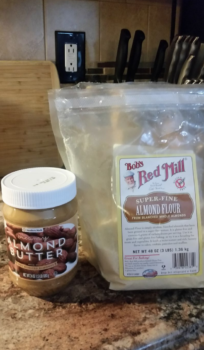William Davis's Blog: Dr. Davis Infinite Health Blog, page 84
July 6, 2017
Wheat Belly: Avoid These 7 Common Mistakes
Newcomers to the Wheat Belly lifestyle make one or more of these common mistakes and are then frustrated with lack of weight loss and/or failure to reverse various health conditions.
Recognize and avoid these common mistakes and enjoy the spectacular health and weight loss benefits of the Wheat Belly lifestyle or the Wheat Belly 10-Day Grain Detox process.
The post Wheat Belly: Avoid These 7 Common Mistakes appeared first on Dr. William Davis.
July 5, 2017
Announcing the Wheat Belly 10-Day Grain Detox BOOTCAMP
JOIN ME FOR A NO-HOLDS-BARRED, TOP-TO-BOTTOM 1-DAY WHEAT BELLY 10-DAY GRAIN DETOX BOOTCAMP AND BOOK SIGNING
Because the Wheat Belly Detox Challenges have been such HUGE successes, I am launching a series of Wheat Belly Detox BOOTCAMPS, intensive one-day workshops that pack the entire Detox program into a single day, to be conducted around the country. Here is what the Bootcamp is all about:
The Wheat Belly Detox Bootcamp distills the wisdom of all of the Wheat Belly books and lessons taught by NY Times best selling author, Dr. William Davis, and learned by millions who have adopted this approach–incorporating the most insightful, cutting-edge, and effective strategies to maximize your chances of success in accomplishing the weight loss and restoration of health you desire.
At this event, Dr. Davis will be sharing the core principles with you, so you can begin your path to weight and health success immediately. This lightning-fast approach has never been detailed in a 1-day event before.
As part of this Bootcamp, signed copies of Dr. Davis’ Wheat Belly 10-Day Grain Detox AND his newest book, Undoctored: Why Health Care Has Failed You and How You Can Become Smarter Than Your Doctor will be provided
Tuition for the Bootcamp also provides you access to in Dr. Davis’ private Wheat Belly Detox Facebook page and and his 21-day Undoctored online companion course to start your journey to better health today!
Topics discussed during the Wheat Belly Detox Bootcamp include:
The practical steps required to purge your home of all grains
How to shop, read labels, and recognize hidden grain booby-traps in food
Strategies to help you endure the often unpleasant first 7-10 days of grain detoxification/withdrawal
Grain-free baking ABCs to help you recreate favorites such as cheesecake, breads, and cupcakes for families, entertaining, and holidays
The three essential make-it-or-break-it nutritional supplements that should be a part of your Detox process for full success
Why efforts to cultivate bowel flora are essential for long-term slenderness, health, and freedom from conditions such as anxiety, depression, constipation, and diabetes
How to persuade naysayers around you, including your own family
How to break weight plateaus or identify factors that impede successful weight loss
Dr. Davis will also provide a discussion on the new and exciting world of Undoctored that shows you how to maximize health benefits without the doctor or healthcare system, including how to begin using some of the new health tools that are available to track health measures.
Our goal: Provide you with all the information and confidence you need to succeed in as little time as possible in regaining control over appetite, weight, and health. Join us for this day-long event to begin enjoying life and health on a scale you may not have thought was possible.
For more information and to sign up, go here. (For those who plan to stay the next day, I am hosting a VIP Q&A Breakfast. Choose your ticket carefully.)
The post Announcing the Wheat Belly 10-Day Grain Detox BOOTCAMP appeared first on Dr. William Davis.
Piña Colada Prebiotic Shake
 Piña Colada Prebiotic Shake
Piña Colada Prebiotic Shake
This delicious recipe is just one of many you will find in Undoctored. This tropical combination of pineapple and coconut is a treat. Use unsweetened frozen or, of course, fresh pineapple, instead of canned. I like using frozen pineapple so that I can use just a little bit at a time and save the rest.
1 peeled green banana or peeled raw white potato, coarsely chopped
1 cup unsweetened coconut milk, almond milk, or hemp milk
1⁄2 cup unsweetened shredded coconut
1⁄4 cup chopped fresh or frozen pineapple
Sweetener equivalent to 1 tablespoon sugar
1 teaspoon inulin or FOS powder (optional)
In a blender, combine the banana or potato, milk, coconut, pineapple, sweetener, and inulin or FOS powder (if using). Blend until the banana or potato has been liquefied and mixed well. If the shake is too thick, add water as needed and blend to mix. Enjoy!
The post Piña Colada Prebiotic Shake appeared first on Dr. William Davis.
Foods rich in prebiotic fibers
Prebiotic fibers are essentially the “water” and “fertilizer” that nourish your bowel flora.These are fibers that you ingest but cannot digest, leaving them for microorganisms in the intestines to consume. Some call prebiotic fibers resistant starch since they are impervious to human digestion and digested by microorganisms. Getting prebiotic fibers is crucial to your health and the success of your diet.
Don’t confuse prebiotic fibers with the more commonly recognized cellulose fibers from bran cereals, bran muffins, and whole grains, not too different from wood fiber. Cellulose is not metabolized by you or by bowel flora, thereby providing nothing more than bulk in bowel movements with none of the physiological benefits of prebiotic fibers. If you came to believe that bran products were the answer to health problems, you were once again fooled by the overly simplistic thinking and/or marketing of the food industry, an argument not too different from “you need more sawdust in your diet.” Cellulose is not harmful, but it does not provide the benefits of prebiotic fibers. The substantial benefits of fiber come via bowel flora digestion of prebiotic fibers to fatty acids and vitamins, not by having a larger bowel movement from cellulose.
The average (unhealthy) American obtains between 3 and 8 grams of prebiotic fibers per day, about half from grains. Measurable health benefits begin at a prebiotic fiber intake of around 8 grams per day, while maximum benefits occur at an intake of 20 grams per day. You should therefore aim to obtain 20 grams each and every day to stack the odds in favor of cultivating a successful bowel flora garden. Now that you know this, what should you eat?
Here are the foods richest in prebiotic fibers:
Green bananas and plantains— And I mean green. Not green-yellow, or a little green at one end, but green. It will be tough to peel and virtually inedible, so slice it lengthwise, shell out the pulp, chop it coarsely, and then use it in one of the prebiotic shake recipes, I provide in Undoctored. You may have to stay alert for when the grocer puts out green bananas, and then either store them in the refrigerator, where they generally stay green for 4 to 5 days, or peel, chop, and store them in a container in the freezer and use as needed.
Potatoes— All potatoes when cooked are high in sugars and low in fiber. But when raw, white potatoes in particular are rich in prebiotic fiber—with 10 to 12 grams per one-half medium (31⁄2 inches in diameter) potato—and contain zero sugar. (Sweet potatoes and yams have far less prebiotic fibers. This means that you chance excessive carbohydrate exposure even when they are consumed raw. Eat only small quantities, whether raw or cooked.) Some people actually enjoy eating raw white potatoes like an apple, while others prefer to include them in prebiotic shakes.
Inulin and fructooligosaccharide (FOS) fibers— From chicory root, Jerusalem artichoke, and other sources, these fibers can be purchased from health food stores as a purified powder. (Inulin has a longer fiber chain, FOS shorter, but they exert similar or overlapping benefits.) Inulin and FOS are easily added to foods such as the “granola.” I provide a great recipe in chapter 10 of Undoctored.
Legumes— Kidney beans, black beans, white beans, chickpeas, other starchy beans, and lentils can be rich sources of the galactooligosaccharide, or GOS, form of prebiotic fibers. Hummus (pureed chickpeas) is another convenient source. However, legumes contain the carbohydrate amylopectin C, and while not as digestible as the amylopectin A of grains, it still has the potential to mess with blood sugars. We sidestep this issue while still obtaining a modest 3 to 4 grams of prebiotic fibers by limiting ourselves to small servings—1⁄4 to 1⁄2 cup cooked with no more than 15 grams net carbohydrates (total carbohydrates minus fiber). (Use your carb-counting resource to calculate for each form of legume. Don’t worry: This gets easy after a few tries.)
Modest quantities of prebiotic fibers (generally around 1 gram per serving) can also be obtained through peas, jicama, turnips and parsnips and other root vegetables, onions, and garlic, as well as apples, oranges, and carrots. Of course, always mind your net-carb counts on these foods.
In summary, try to include prebiotic fiber choices from the following list every day.
Green bananas and plantains: 10.9 grams per 1 medium (7-inch) banana (0 gram net carbs)
Raw white potato: 10 to 12 grams per 1⁄2 medium (0 gram net carbs) (Avoid any raw potatoes with green skin, as this is a fungus. If encountered, peel off the skin.)
Inulin and /or FOS powders: 5 grams per teaspoon (0 gram net carbs)
Hummus or chick peas: 8 grams per 1⁄2 cup (13.5 grams net carbs)
Lentils: 2.5 grams per 1⁄2 cup (11 grams net carbs)
Beans: 3.8 grams per 1⁄2 cup (white beans are the richest with twice this quantity) (12 grams net carbs)
Note: Values for prebiotic content vary depending on the source and the method used to measure.
The post Foods rich in prebiotic fibers appeared first on Dr. William Davis.
I shall be LIVE on the Undoctored Inner Circle Virtual Meetup Thursday, July 6th
I shall be LIVE again on the Undoctored Inner Circle Virtual Meetup on Thursday July 6th at 7 pm Central/8 pm Eastern/6 pm Mountain/5 pm Pacific.

Let’s again discuss the Undoctored program: pitfalls, difficulties, and ways to succeed. The Virtual Meetup function allows us to meet as a group to discuss issues or questions via live video. Let’s specifically discuss nutritional supplements and thyroid issues.
We previously limited attendance to 10 people per session because background distractions such as dogs, kids, spouses, and loud TVs can disrupt the conversation. But the last session went so smoothly that we are going to trial an increase in attendance to 20. However, be aware that, should loud noises erupt in your background, such as your dog barking or kids calling “Mommy, mommy,” then please mute your audio input. (Mouse over the lower left hand corner of the virtual “room” and click on the microphone avatar.) You can unmute if/when the distraction ends.
Also, activating your computer’s video camera so that we can see your face is entirely optional: you can choose to be seen or you can choose to not be seen. Once again, mouse over the lower left hand circle and click on the video camera avatar to choose.
(The Undoctored Inner Circle is a paid membership site that includes features such as the live Virtual Meetup, webinars, the Undoctored Health Network video collection, Health Tool Product Reviews, and a Discussion Forum.)
To join, go to the Undoctored Inner Circle and sign in.
The post I shall be LIVE on the Undoctored Inner Circle Virtual Meetup Thursday, July 6th appeared first on Dr. William Davis.
July 4, 2017
The History of the Undoctored Program
When and how did the seemingly unconnected strategies of the Undoctored lifestyle come together?
The Undoctored strategies, when practiced all at once, have the power to reverse coronary plaque, type 2 diabetes, acid reflux, IBS, fibromyalgia, many autoimmune diseases, some forms of chronic pain, as well as accomplish substantial weight loss without effort.
But how was this all pieced together? Here, I recount the process that led me down this unexpected road.
About Undoctored:
We are entering a new age in which the individual has astounding power over health–but don’t count on the doctor or healthcare system to tell you this.
We draw from the health information of the world, collaborate, share experiences, collect data, and show how to apply new health tools to achieve levels of health that you may have thought unattainable. We do all this at a time when conventional healthcare costs have become crippling.
The result: personal health that is SUPERIOR to that obtained through conventional means.
Undoctored: Why Health Care Has Failed You and How You Can Become Smarter Than Your Doctor
Available in all major bookstores and Amazon.
The post The History of the Undoctored Program appeared first on Dr. William Davis.
July 2, 2017
Join us on the new Undoctored Connect
Join us on the new social media site for the Undoctored lifestyle, Undoctored Connect.
This is my way of ensuring that all important new information that empowers you in health reaches you, as over 90% of the information I provide to readers NEVER REACHES YOU.
This is also the place in which you can enter your health data so that we can accumulate the data of many people over time to report the collective results. (All data anonymous, of course.) Enter basic info into the Health Track, along with prescription drugs and symptoms. We want to prove to the world just how healthy we can become without drugs, without doctors, without hospitals.
Go to Undoctored Connect.
About Undoctored:
We are entering a new age in which the individual has astounding power over health–but don’t count on the doctor or healthcare system to tell you this.
We draw from the health information of the world, collaborate, share experiences, collect data, and show how to apply new health tools to achieve levels of health that you may have thought unattainable. We do all this at a time when conventional healthcare costs have become crippling.
The result: personal health that is SUPERIOR to that obtained through conventional means. We are Undoctored.
Undoctored: Why Health Care Has Failed You and How You Can Become Smarter Than Your Doctor
Available in all major bookstores and Amazon.
The post Join us on the new Undoctored Connect appeared first on Dr. William Davis.
July 1, 2017
FAQ: Should I take vitamin K2?
Vitamin K2 is not a core component of the Wheat Belly or Undoctored programs. But there are clinical studies demonstrating that adequate K2 intake can contribute to bone and heart health. So should you add it to your program?
Vitamin K2 is indeed worth considering, but you should know about the issue of bowel flora and K2 for future reference.
(The photograph shown in the blog post title is natto, fermented soybean. If you can eat natto, you are tougher than I am.)
About Undoctored:
We are entering a new age in which the individual has astounding power over health–but don’t count on the doctor or healthcare system to tell you this.
We draw from the health information of the world, collaborate, share experiences, collect data, and show how to apply new health tools to achieve levels of health that you may have thought unattainable. We do all this at a time when conventional healthcare costs have become crippling.
The result: personal health that is SUPERIOR to that obtained through conventional means. We are Undoctored.
Undoctored: Why Health Care Has Failed You and How You Can Become Smarter Than Your Doctor
Available in all major bookstores and Amazon.
The post FAQ: Should I take vitamin K2? appeared first on Dr. William Davis.
Doctor: “I don’t believe in supplements.”
Patricia shared her recent experience of having to endure the rants of her doctor:
“Well, I guess that I am officially undoctored! I have been going to the same internist for two years and she has always said that she knows nothing about supplements. But that was okay, as I do know something about them.
“During this time, my medication has not changed, blood work was the same, with almost the same results each time. Just this week, she kind of went ballistic, repeated that she knows nothing about supplements, but does not believe in them, cannot imagine why people take them, told me that they were totally screwing up my body, and if I did not stop taking them, do not come back.
“I said ‘thanks’ and ‘good-bye.’
“Love the book!”
Patricia did the right thing: ignored the doctor’s rant, accepting it for the admission of gross ignorance that it reflects, and walked out, never to return. This is part of the message of my new Undoctored book: We insist that healthcare providers act as our advocates, a collaborative relationship in which both parties make a contribution. The dictatorial attitude of Patricia’s doctor, coupled with her astounding admission of ignorance on nutritional supplements, means that she could not achieve health through this provider, only prescription drugs and procedures that have little or nothing to do with health. Given her ignorance on supplements, it is likely that she was equally ignorant about nutrition. Without knowledge of nutritional supplements and nutrition, how could any doctor hope to understand health? Or provide useful advice on health?
If you took your car to the auto mechanic and he ranted on and on about how taking good care of your car was silly and that an occasional engine rebuild or transmission replacement was all you needed to keep driving, while providing no solutions to lesser problems you’ve experienced, you would likely walk out, too. You might even refuse to pay the bill because he failed to fix the problems–funny noise, occasional stalls, overheating, etc.–that you reported.
Then why should we pay a doctor for such an outright admission of ignorance with no useful advice offered?
I wouldn’t share Patricia’s story if it were unusual or rare. But it is common: doctors, like the FDA, make absurd declarations such as “Nutritional supplements cannot be used to treat any condition. Only drugs can do that.” (Yes, this is actually stated in FDA materials.) This attitude means that ignorance about the safe, informed use of nutritional supplements is the rule–even if they provide life-changing or even lifesaving benefits. Witness the evidence of widespread medical ignorance that has operated these past 40 years because of this attitude:
Iodine supplementation has been forgotten since iodized salt essentially erased iodine deficiency during the 20th century. In the 21st century, we’ve been advised to cut back on salt that has prompted a return of iodine deficiency, hypothyroidism from iodine deficiency, and goiter.
Vitamin D supplementation with non-human vitamin D2 (ergocalciferol), the most costly prescription form, is more often advised than the human D3 (cholecalciferol) even though D2 is inferior and does not provide the same reduction in death rate as D3.
Fish oil was rarely advised by doctors as an inexpensive supplement, but is now widely prescribed as a “drug” costing 20- or 30-times more for a preparation that is not superior to fish oil from the health food store.
Calcium supplementation (yes: a supplement) is commonly advised for bone health despite the fact that it does not increase bone density nor decrease osteoporotic fractures and likely increases cardiovascular risk substantially
Magnesium deficiency is widespread and contributes to osteoporotic fractures, heart rhythm disorders, and sudden cardiac death, since magnesium is removed from all drinking water and commercially-produced vegetables have up to 60% less magnesium than the past. It can only be corrected with magnesium supplementation.
There are many others. But you get the idea: In general, doctors are astoundingly ignorant about nutritional supplements. Rather than learn about them, they pooh-pooh them like Patricia’s doctor, make fun of you if you take them, and insist that only drugs and procedures are effective tools for health.
What I hear in the rants from my colleagues in such situations was: “Why are you wasting my time with all these questions about health? I am busy dispensing drugs and procedures to people who compensate me better than just answering your silly health questions!”
Because our focus is health, not revenues from health, we are free to explore ideas and practices that genuinely work in maintaining or regaining health. And, with some benign guidance, you can obtain health that is dramatically superior to the “health” the doctor would have you achieve. This is the Undoctored way.
The post Doctor: “I don’t believe in supplements.” appeared first on Dr. William Davis.
June 30, 2017
Big Box shopping for Wheat Belly and Undoctored
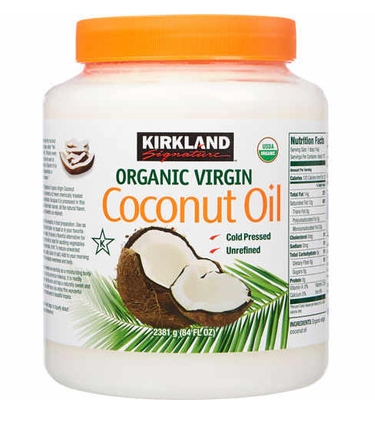 Many people are cost-conscious living the grain-free Wheat Belly and Undoctored lifestyles. Because we prefer to choose higher quality foods–organic, pasture-fed, without synthetic ingredients like emulsifying agents or cheap fillers–we risk running up our grocery bills. (Recall, however, that our greater exposure to more costly foods is counterbalanced by the reduction in appetite we experience, i.e., typically 400-800 fewer calories per day per person that you no longer need to purchase and prepare, a substantial cost savings.)
Many people are cost-conscious living the grain-free Wheat Belly and Undoctored lifestyles. Because we prefer to choose higher quality foods–organic, pasture-fed, without synthetic ingredients like emulsifying agents or cheap fillers–we risk running up our grocery bills. (Recall, however, that our greater exposure to more costly foods is counterbalanced by the reduction in appetite we experience, i.e., typically 400-800 fewer calories per day per person that you no longer need to purchase and prepare, a substantial cost savings.)
The Big Box stores such as Costco, Sam’s Club, and BJ’s Wholesale Club carry many of our staples that further help keep our costs down. I recently polled our social media readership to show us what products they’ve found in these stores to help you save money, as well as provide some convenience in sparing you the effort to go from store to store to find the foods we need. Among the finds of our readers:
Costco
Katelyn: “I love the Chosen Foods mayo for chicken salad…organic chicken, celery, onion, and mayo, pulsed in the food processor, stuffed into tomatoes for a yummy lunch. Bought at Costco.”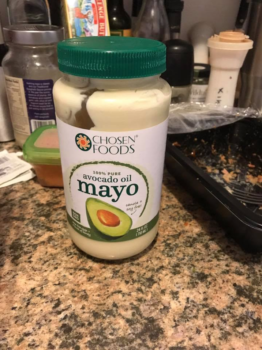
Leona: “Love all your Wheat Belly books, which I bought at Costco. These are just a few things I’ve bought. The Spring Mix is used for our salads, the Coconut Oil is almost gone. Use it all the time for cooking instead of butter and use it as a face and body lotion. The Whisps are a great snack by itself or used in salads or instead of a cracker, so good! The Olive Oil is used for sauteing veggies, salads and I give to my cats mixed in their food. No fleas or hairball for my cats!”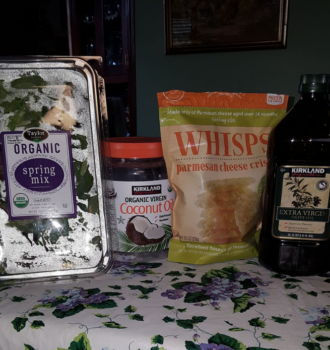
Melissa: “Costco, Henderson, Nevada. We get all of our frozen organic veggies, organic meats & organic chicken from Costco.”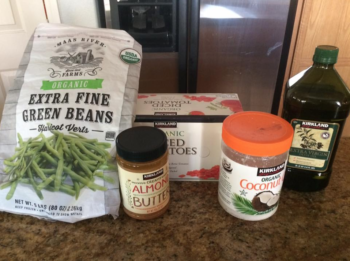
Stacey: “Costco is always the best place to buy avocados for the ‘snack’ bowl, not to mention avocado oil.”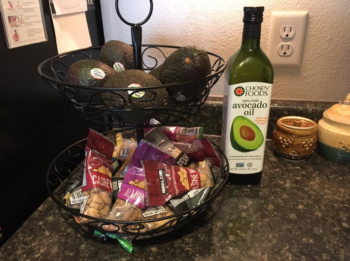
Marcella: “Cooking, smoothies, stir fry, and snacks from Costco. Yum!”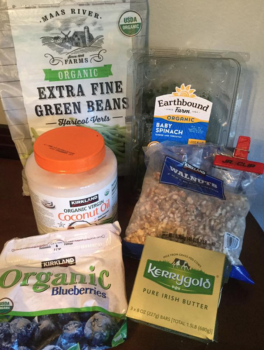
Sam’s Club
Christine: “Many items, but this is my favorite from Sam’s Club, Pederson’s 40 oz bacon $19.99 ingredients: Pork, water, Less than 2% of: Salt, Vinegar, Celery Powder. In two convenient 20 oz. packs.”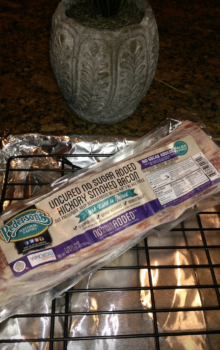
Rosa: “Some of my staples from Sam’s Club.”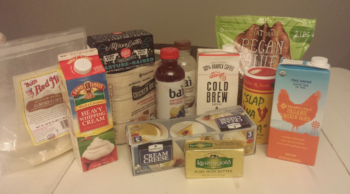
Tammy:
The post Big Box shopping for Wheat Belly and Undoctored appeared first on Dr. William Davis.
Dr. Davis Infinite Health Blog
Recognize that this i The insights and strategies you can learn about in Dr. Davis' Infinite Health Blog are those that you can put to work to regain magnificent health, slenderness, and youthfulness.
Recognize that this is NOT what your doctor or the healthcare system provides, as they are mostly interested in dispensing pharmaceuticals and procedures to generate revenues. The healthcare INDUSTRY is not concerned with health--you must therefore take the reins yourself.
Dr. Davis focuses on:
--Real, powerful nutritional strategies
--Addresing nutrient deficiencies unique to modern lifestyles
--Deep insights into rebuilding the microbiome disrupted by so many modern factors
Follow Dr. Davis here and on social media and you can witness the extraordinary successes people enjoy on his programs. ...more
- William Davis's profile
- 160 followers




